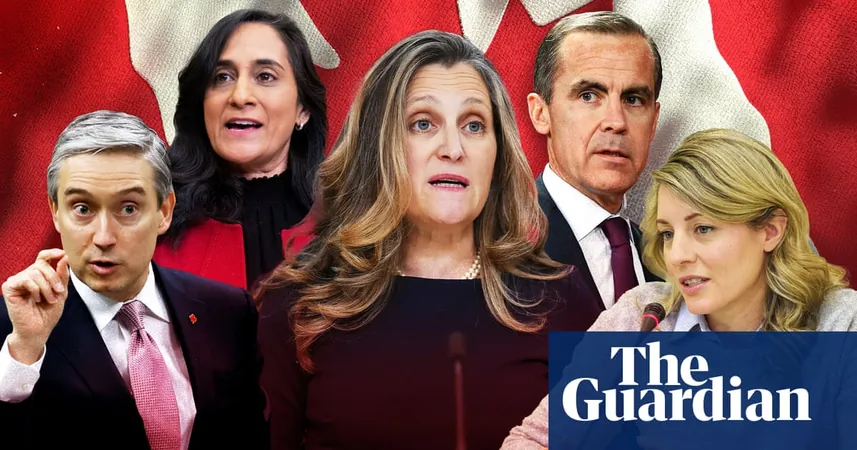
Who Will Take the Helm After Justin Trudeau? The Contenders for Canada's Liberal Party Leadership!
2025-01-07
Author: Jia
With Justin Trudeau's recent announcement of his impending resignation, the Canadian Liberal Party faces a crucial juncture as it seeks a new leader. Anticipating a potential parliamentary shake-up when it reconvenes in March, the party is eager to secure a successor swiftly.
This week, the party's national board will convene to kick off the leadership process, which historically could span several months. However, recent polls indicate a challenging landscape for the Liberals, suggesting they may lose the next election regardless of who leads them. This uncertainty may deter prospective candidates from stepping forward. Let’s delve into some prominent individuals who could consider entering the race.
Chrystia Freeland
A formidable contender, Freeland has served as Deputy Prime Minister and former Finance Minister and is credited with sparking Trudeau's resignation by stepping down due to their disagreements. Known for renegotiating the North American Free Trade Agreement (NAFTA), she is seen as a seasoned politician capable of navigating critical global issues. Her extensive experience in government roles since 2015 positions her as a top candidate.
Mark Carney
Mark Carney, former Governor of both the Bank of Canada and the Bank of England, is another strong possibility, though his lack of political experience raises eyebrows. Announcing that he would consider a leadership bid, Carney’s economic expertise is appealing amid the current economic challenges. Nonetheless, he would need to secure a parliamentary seat if he were to lead the party.
François-Philippe Champagne
Champagne currently serves as the Minister of Innovation, having previously held the Foreign Affairs portfolio. His track record for securing significant deals—like a C$2.8 billion investment in electric vehicle production—highlights his capabilities. As a Quebec native, he may resonate with the crucial Quebec electorate, which is critical for any Liberal leader.
Mélanie Joly
Joly, the Minister of Foreign Affairs, garnered attention from the media as a possible successor to Trudeau, although she quickly reiterated her support for him after a profile piece suggested she was a leading contender. Her background in international law and experience in managing diplomatic tensions with countries like India and China add to her profile, although recent criticisms may pose challenges for her leadership ambitions.
Anita Anand
A rising star within the Liberal cabinet, Anand's reputation was built during her tenure as the Minister of Defence and her handling of procurement during the COVID-19 pandemic. Her recent role as President of the Treasury Board has intensified speculation about her aspirations, making her a figure to watch as the leadership race unfolds.
Dominic LeBlanc
Political veteran LeBlanc, who has longstanding ties to Trudeau, is considered a reliable candidate with notable experience. Although he has previously sought party leadership, his close connections to Trudeau and a family history in Canadian politics may influence his decision to enter the race again.
Christy Clark
Former British Columbia Premier Clark is emerging as a contender with a distinctive approach, separated from Trudeau's administration. By communicating her desire for a more inclusive party, she aims to attract disillusioned Liberal supporters. However, her limited proficiency in French may hinder her chances in the predominantly Francophone province of Quebec.
As the Liberal Party faces a critical election ahead, the decision on who will take the reins could significantly impact Canada's political landscape. The stakes are high, and the race is just beginning. Who will emerge victorious and lead the party into the uncertain waters of Canadian politics? Stay tuned for what promises to be a thrilling leadership contest!


 Brasil (PT)
Brasil (PT)
 Canada (EN)
Canada (EN)
 Chile (ES)
Chile (ES)
 Česko (CS)
Česko (CS)
 대한민국 (KO)
대한민국 (KO)
 España (ES)
España (ES)
 France (FR)
France (FR)
 Hong Kong (EN)
Hong Kong (EN)
 Italia (IT)
Italia (IT)
 日本 (JA)
日本 (JA)
 Magyarország (HU)
Magyarország (HU)
 Norge (NO)
Norge (NO)
 Polska (PL)
Polska (PL)
 Schweiz (DE)
Schweiz (DE)
 Singapore (EN)
Singapore (EN)
 Sverige (SV)
Sverige (SV)
 Suomi (FI)
Suomi (FI)
 Türkiye (TR)
Türkiye (TR)
 الإمارات العربية المتحدة (AR)
الإمارات العربية المتحدة (AR)